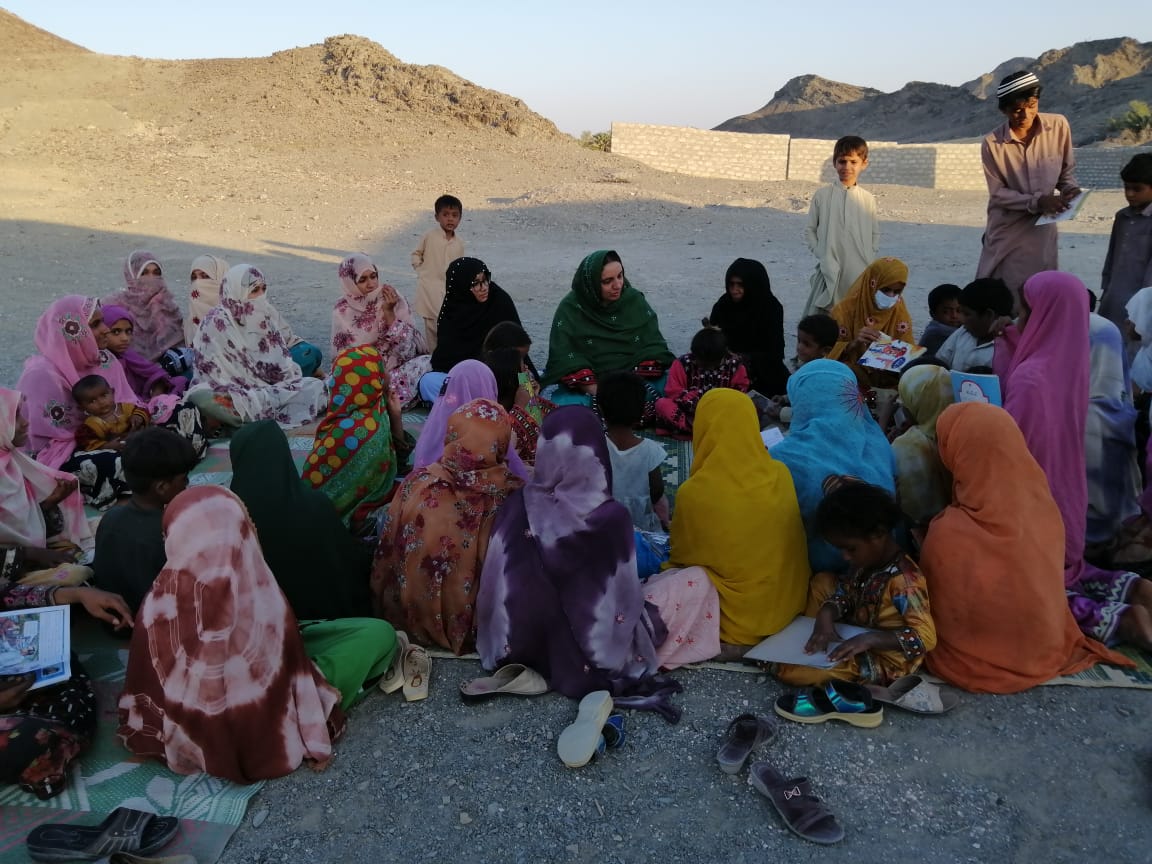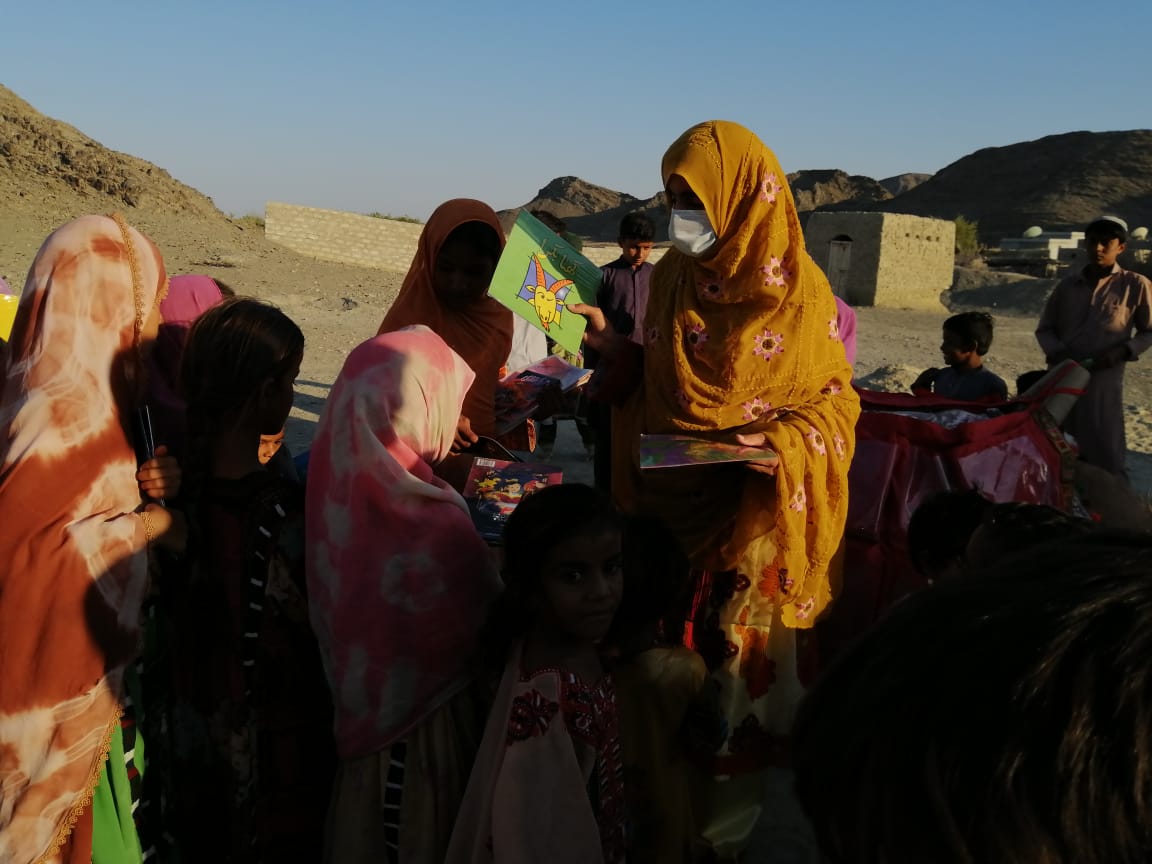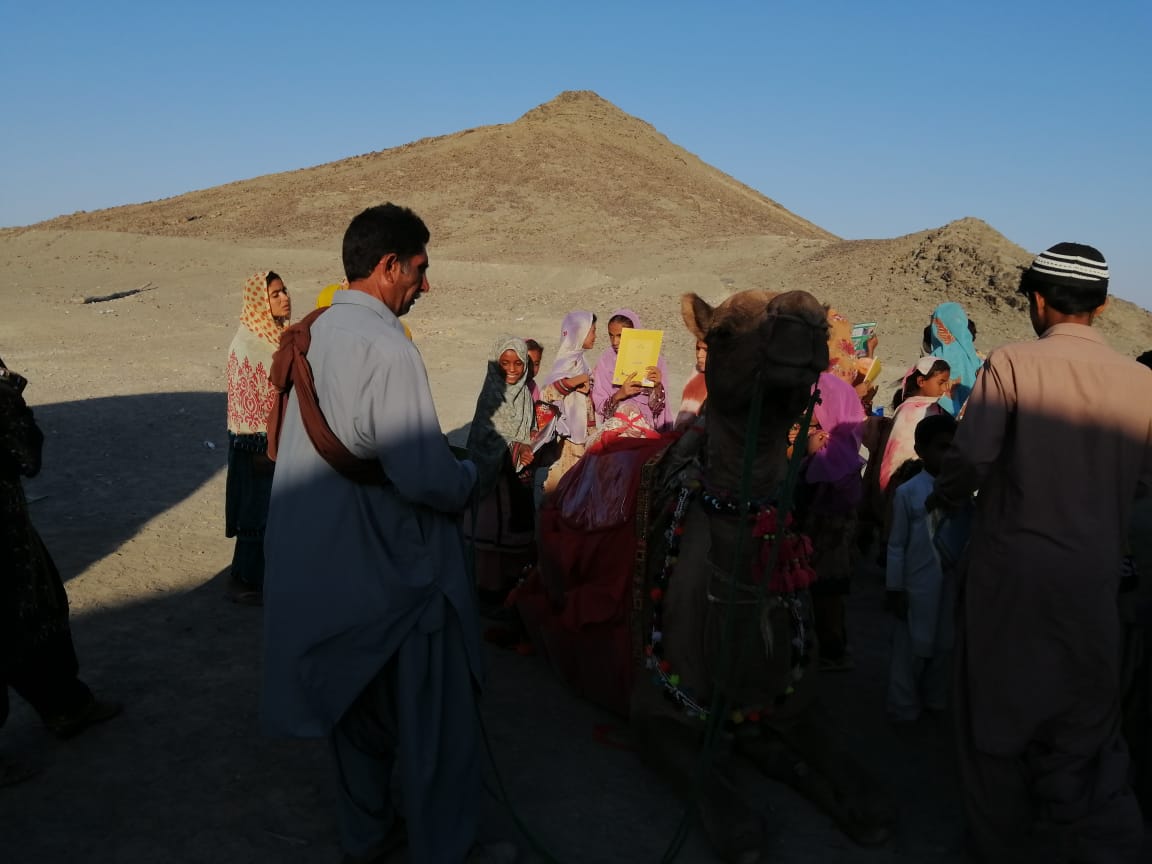QUETTA: In a remote part of Pakistan, two women and a charity have come up with a novel idea to help children continue reading and learning — a camel bearing books.
Pakistan closed its schools in March and sent over 50 million school and university-going Pakistanis home. The closures have put children in Balochistan at particular risk of falling behind, as the province is Pakistan’s most impoverished, with few schools and the lowest literacy rate in the country.
According to data from the Pakistan Bureau of Statistics, up to 62 percent of children between the ages of 5 and 16 are out of school in rural areas of Balochistan.
With the coronavirus pandemic threatening even more children, two sisters from Balochistan, Raheema Jalal, the principal of the Zubaida Jalal Girls High School, and Zubaida Jalal, the Pakistani minister for defense production, thought: if children couldn’t go to school, why not take the books to them?

Women and children gather to read books in Kech district, Balochistan, Pakistan, on November 6, 2020 (Photo courtesy: Haneefa Abdul Samad)
The sisters, who run the Female Education Trust Balochistan (FETB), reached out to the Alif Laila Book Bus Society (ALBBS), which has established more than 7,000 mobile libraries across Pakistan, with over 1.5 million books donated in the past four decades. In collaboration, they launched a mobile library that deploys local herder, Murad Dur Muhammad, and his 12-year-old camel, to carry books to help hundreds of children continue their education in Balochsitan’s remote Kech district.
The idea had previously been used in Ethiopia by Save the Children.
“When Zubaida Jalal learnt that camel libraries were being used in Ethiopia she thought of the joy such libraries could bring to children in Mand [a town in Balochistan province] and how they could help raise the literacy rate in the area,” said Syeda Basarat Kazim, president of the Alif Laila Book Bus Society.
“Alif Laila approached the Judith’s Reading Room with a proposal,” Kazim said, referring to a US-based organization that runs libraries in 22 countries. “The board of governors chose this as their board option prize and Mand’s camel library became the 101st Judith’s Reading Room library.”
Alif Laila prepared the library, named the camel, purchased books, games, puzzles and puppets in record time and the library was launched in October, Kazim said.
The camel was named Roshan, or bright light, Reheema Jalal said, “because he has been lighting [the path of] education for the deprived children of Balochistan.”
Since October 2, Roshan has taken his library of fifty books to six villages of Mand. Over 150 children have borrowed books from the program in the past six weeks, Raheema said.
The titles are in both Urdu and English and include storybooks, and books of general knowledge, science and Islamic studies. A majority of the children targeted are from grades one to six, but secondary school students have also borrowed books from the mobile library.
“Roshan supplies the books on Friday, Saturday and Sunday and covers three different villages every week,” Raheema said. “The library is open for two hours, from 4 p.m. to 6 pm. Children choose the books they like and return them after a week.”

Women and children gather to read books in Kech district, Balochistan, Pakistan, on November 6, 2020 (Photo courtesy: Haneefa Abdul Samad)
Roshan and Muhammad are also often accompanied by Haneefa Abdul Samad, a 30-year-old science and math teacher, who supports the duo by helping answer the children’s queries.
“Initially, I was reluctant as to how the idea would work in remote villages,” Samad, who is also the coordinator of the project, said. “But after seeing the reaction and love of children toward books, I decided to accompany Roshan to every single village of Kech.”

Locals gather around 12-year-old camel, Roshan, who carries books to help hundreds of children continue their education in Kech district, Balochistan, Pakistan, on November 6, 2020 (Photo courtesy: Haneefa Abdul Samad)
“As Pakistan grapples with the deadly coronavirus, and educational activities across the country are yet to be fully restored, the camel library has been engaging children to continue their studies and attachment with books,” Samad added.
One such student is Sara Abdul Rauf, a seventh grader from the Koh-e-Pusht village, who eagerly awaits Roshan’s visits.
“Not [just] me, but all the children, especially girls, are very happy with the camel library,” the 14-year-old, who wants to be a doctor, said. “It has been providing us with books at our doorsteps.”
The initial plan for the camel library was to reach “as many villages as possible” over a three-month period. But Raheema now hopes, with Alif Laila’s help, to expand the project to other areas of Kech and hire more camels to keep Roshan company.
“We had planned this program till December,” she said. “Fortunately, we have received a positive response from the children. After December, we will look for more donors and hire more camels to reach more villages of Kech.”












